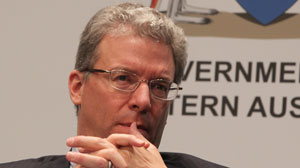
In Britain, government officials and citizens have been speaking out about “excessive” executive bonuses, particularly for executives working for companies that have reported sub-par performances. Recently, two executives at RBS have rejected their bonuses. This trend has also spread to other companies including Lloyd’s, Rio Tinto, and British Network Rail.
RBS chief Hester called upon to reject payout
RBS, which is now mostly owned by the government, caved to public pressure to rescind its announced bonus to CEO Stephen Hester. In January, the bank announced that Hester was in line to receive an annual bonus of nearly £1m in company shares, despite the bank’s abysmal performance last year. According to a statement released by the bank, the bonus was deserved because of the “substantial progress” Hester had helped the company make during the previous year.
Upon hearing of the announcement, Foreign Office Minister Jeremy Browne criticised the payout, saying: “Even if there’s a contractual opportunity for him to have a bonus it doesn’t mean he has to accept it. He is effectively a public servant in a bank which is almost completely owned by the taxpayers.” Three days later, Hester announced he would not accept the bonus. Following the announcement, RBS Chairman Sir Philip Hampton also announced he would not accept his annual bonus, which amounted to £1.4m in company shares.
Further executive bonus compliances
A few weeks before Hester announced that he would not be accepting his bonus, Antonio Horta-Osorio, head of Lloyd’s of London, voluntarily refused his executive bonus of £2.4m, saying that his sick leave had negatively affected the bank’s performance in 2011. Horta-Osorio also remarked that his compensation should mirror the “tough financial circumstances that many people are facing.”
In early February, CEO of British Network Rail David Higgins, announced that he would not accept his annual bonus either. Higgins was due to receive up to £340,000 but decided he would “forego any entitlement and instead allocate the money to the safety improvement fund for level crossings.” Unlike RBS, British Network Rail has been performing well financially. However, the company has been under fire for admitting that it did not enforce safety regulations that could have prevented the 2005 death of two teenagers at a level crossing.
A few days later, the Rio Tinto mining corporation announced that its CEO and CFO would not accept their annual bonuses. The company fell into financial difficulties in 2011 that led to a £5.6bn loss. Speaking on the decision to refuse the payout, CEO Tom Albanese said: “As the acquisition of (aluminium corporation) Alcan happened on my watch, I felt it only right not to be considered for an annual bonus this year.”

